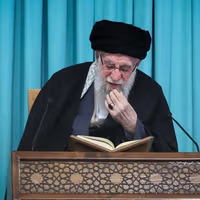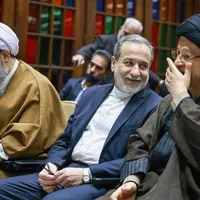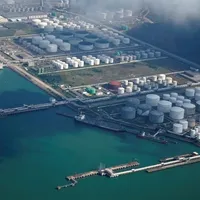The blaze has affected Elit forest, part of Iran's Hyrcanian forest belt along the southern Caspian Sea coast, a 50-million-year-old ecosystem UNESCO added to the World Heritage list in 2019 for its exceptional biodiversity, including more than 3,200 plant species.
In a report on Sunday, Iran’s semi-official ISNA wrote that the fire in Elit forest has been burning for about 20 days, adding that the head of natural resources in Mazandaran province rejects this and says two separate fires occurred in the area 10 to 15 days apart.
ISNA's said local residents insist the blaze has continued without interruption since November 1, with smoke showing it never fully went out.
The report said pockets of fire remained even after a firefighting aircraft was deployed, and quoted Mazandaran governor Mehdi Younesi as saying 400 to 450 personnel had been sent from neighboring provinces while residents had been on the scene from the first moments.
ISNA added that Iran has asked other countries for help, and cited lawmaker Kamran Pouladi saying Turkey, Russia and Belarus offered assistance and that a Turkish aircraft is already operating at the site.
Public anger over government response
Users on social media expressed anger over the slow and limited response, accusing authorities of neglect and leaving residents to fight the fire with little support.
“The fire climbs up the forest slopes, swallowing the trees, and people with bare hands run after it to stop it,” user Azam Bahrami wrote, criticizing officials for abandoning local residents.
Environmental activist Hamed Tizroyan said in an Instagram Story that “if it were not for public protests, these officials would not even get up from their chairs to see what is happening,” a comment widely shared as users blamed poor oversight, inadequate resources and late managerial presence for the fire’s spread.
Another user, Zahra, linked the blaze to broader environmental pressures, including heavy pollution in Tehran and dam levels at their lowest in decades, saying authorities were focused on unrelated domestic debates “while a UNESCO-listed forest is burning.”
Several users also praised volunteers and local rescue teams, saying the disaster would have been far worse without them, and questioned why Iran still lacks a functional aerial firefighting fleet despite years of recurring wildfires.
Volunteers say pleas for help went unanswered for days
The Tehran-based Ham Mihan newspaper published a field report quoting local volunteers who said the operation “was not possible with only one water drop per day,” adding that they were losing “one hectare of forest every moment.”
A mountaineer involved in the effort said the first helicopter arrived on November 17, even though volunteers had requested one on November 10 and had been fighting the fire without equipment for days.
Another local resident told the newspaper early warnings were ignored, saying: “We said if the autumn winds start, it will be a disaster — and that is exactly what happened.”
Exiled prince denounces government handling of fire
Iran’s exiled prince Reza Pahlavi accused Tehran’s clerical establishment of indifference toward the fire.
“The Islamic Republic is indifferent to the fire consuming the Hyrcanian forests, because for this anti-Iranian regime, the destruction of Iran’s thousands-year-old natural heritage means nothing,” he said in a statement on Sunday.
“Our ancient Iranian forests burn defenseless — just as several generations of Iranian lives have been destroyed by this regime,” he added.
He said the government spends the nation’s wealth on "terrorism and the spread of hatred and destruction” instead of protecting the environment.
Pahlavi said the Iran Prosperity Project — a policy platform developed by his team — includes a comprehensive plan to restore the country’s environment.
“The people of Iran will put an end to this path of ruin, and with the end of this oppression, the country’s environment will also be saved,” he said.


















